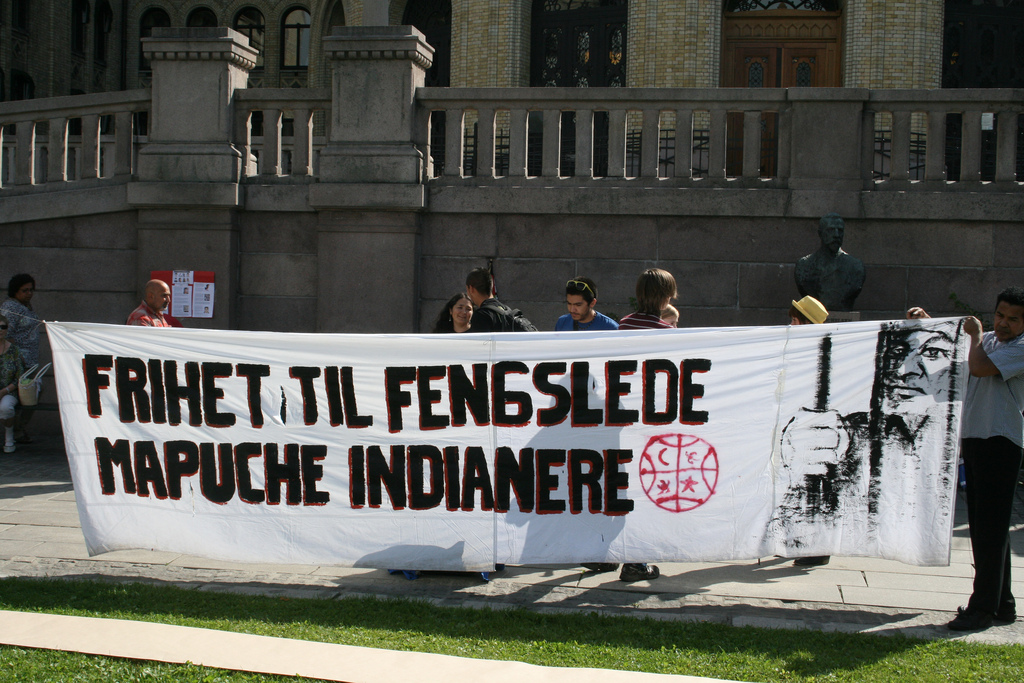
Støttedemonstrasjon for sultestreikende mapuche-indianere i Chile; foran Stortinget i Oslo 14. august 2010. Parole: Frihet til fengslede mapuche-indianere.
Marian Willuhn
The Norwegian state-owned hydropower company Statkraft finds itself amidst an indigenous uprising as it the company seeks to build a hydro-power dam on land indigenous people, Mapuche, of Chile claim theirs. As the majority shareholder in the Chilean hydropower company Empresa Eléctrica Pilmaiquén S.A. Statkraft is responsible for planning, building and negotiating with civil society.
Decades of marginalisation, persecution and land grab have turned the Mapuche sceptical at best and violent at worst. In the recent history there have been re-occurring stories in which the Mapuche had been involved in violent protests over concerns that the Chilean government would take their land for logging and other activities.
In the early nineties following long negotiations, the government of Chile was planning to sign ILO Resolution 169 in order to legally solidify the land rights of the Mapuche and pacify the society. A parallel uprising of another group which was concerned about the NAFTA free trade agreement put the Chilean government off this course and relations between indigenous peoples and the government have deteriorated again.
ILO Resolution 169 is a core piece of international law for indigenous peoples as it stipulates the sovereign rights to the lands claimed by indigenous peoples. Signatory states committed to help keep the culture alive and respect their holy sites as well as their prime right to dispose of the natures resources. This right has attained the status of a human right and Norway itself has ratified out of respect for its own indigenous population; the Sami. Statkraft reiterates that their activity is within the norms of international law, but there are some aspects to consider.
It is true that Chile did not ratify the relevant resolution; a violation of the land rights of the Mapuche would still prove extremely poor moral standards from the Norwegian company. More so in consideration that Norway is an advocate of indigenous people’s rights on its own soil; disrespecting the land rights of indigenous peoples in Chile for business interest would display double standards.
Since the 1980s the rights of indigenous peoples were increasingly more cut as transnational companies claim rights to economic development. The dictatorship under Pinochet completely disregarded the rights of the Mapuche and their land has been decreased in size significantly.
Though, after the return of democracy, negotiations and dialogue with the Mapuche started again, they are still subject to racism and classism and their political actors are often persecuted. Some Mapuche communities have engaged in more violent forms of protest following the discrimination. The situation is still tense and there are repeatedly reports in which cars or houses are set fire to as form of protest. The police are continuing to arrest Mapuche leaders and declare Mapuche organisations to terror groups and «organized crime». The atmosphere is volatile and all parties to that dam need to be aware of this sensitive history in order to avoid adding more fuel to the fire. In light of this history Statkraft needs to understand that the Mapuche feel threatened by hydropower plans as their voices were so often silenced.
Previously the World Banks IFC regulation demanded that hydropower projects on the Bio Bio River were granted approval by the National Indigenous Development Corporation (Conadi). After Mapuche members of the Conadi board had vetoed a project they have been removed and the board now consists of no indigenous peoples and is clearing the legal way for building dams on Mapuche land. It is events like this that make the Mapuche extremely cautious about which actors seek to invest in their land. Statkraft had not shown the sensibility, which would have been necessary in order to not further amplify the conflict. The plans for the dam project have sparked outrage and demonstrations among the Mapuche and are threatening a long overdue reconciliation process. The Chilean government should extend its efforts to find an overall agreement with the Mapuche on how to facilitate co-existence and dispose of the natural resource. Incoming news of plans on future dams are very counter-productive for that purpose.
According to a Statkraft official, the Mapuche had been contacted and asked for consent with the project. A formal agreement the official is referring to, had been crafted between the previous owner of the dam project and five Mapuche communities. The Mapuche have far more communities, and they are not uniform in their opinions, thus this document cannot really be considered as a representative documentation of consent. Furthermore the document is currently processed and scrutinized under the Superintendencia del medio ambiente Chile’s environmental agency. They need to clear the project before building can commence. Statkraft needs to improve their communication and negotiation strategy in order to settle an adequate agreement with a people that have been subject to exploitation, land grab and persecution.
Aside from the fact that the Mapuche themselves ought to make the decision whether a proportion of their land can be flooded as the consequence of a dam project, the religious and spiritual value of the river and the nearby site are tremendously important in this issue. The flooded area will incorporate a range of holy site that are vital to Mapuche culture and their history. Submerging them would present complete disregard to their culture and autonomy, contrary to the international standards Statkraft should follow.
The rising protests of members of the Mapuche here in Oslo and on a larger scale in Chile are evidence that consent has not been attained. Considering the human rights situation which protects the condition that indigenous people must consent to their land being used for economic purpose especially at such important spiritual sites like the ones in question, Statkraft has a lot of work to do. Making statements which stipulate that Statkraft has consent and the right to build the dam are contrary to human rights norms and display the lack of sensitivity and insight Statkraft has on this issue.
In order to reach a peaceful agreement with the Mapuche a large scale consultation and dialogue process should be initiated by Statkraft. Such a dialogue would show that Statkraft recognizes the land rights of the Mapuche and respects their holy sites. By treating the Mapuche as equals and fully accepting that they will have the last word on whether a dam is going to be built or not, could be more productive and the Mapuche would not have the chilling feeling of having their land stolen yet again. This however also means that Statkraft must be willing to give up their project if there is no consent to find with the Mapuche, since that would be coherent with Statkraft’s promise to adhere to the highest human rights standards when conducting operations. Furthermore, now that Statkraft is a major player in Chile’s power market it holds responsibility to get Mapuche members back on the board of Conadi. Without Mapuche members on that board the clearances for dam projects issued by that board are not in line with the requirement of indigenous people participation standards and therefore rendered invalid.

